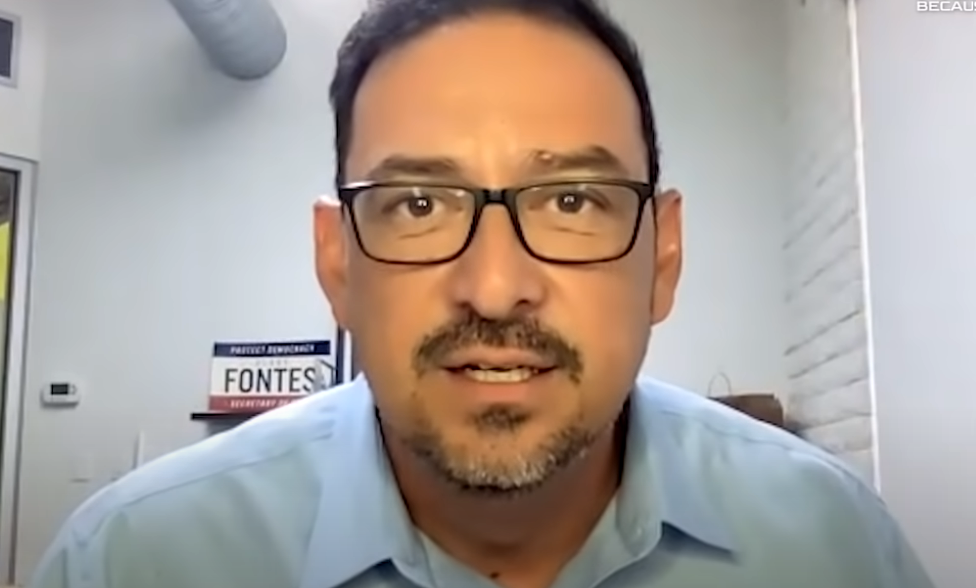
by AZ Free Enterprise Club | Apr 9, 2025 | Opinion
By the Arizona Free Enterprise Club |
Adrian Fontes has proven himself to be good at two things during his tenure as Arizona’s Secretary of State: losing in court and throwing tantrums. It’s really unfortunate. The state’s top election official is not supposed to be taken to court on a regular basis—especially for, you know, his repeated attempts to undermine election integrity. And of course, throwing tantrums should be more characteristic of toddlers, not a government official. But Fontes can’t help himself.
In his latest tirade, Fontes joined Hillary Clinton’s old consigliere Marc Elias on Democracy Docket to whine about President Trump’s recent executive order to preserve and protect the integrity of American elections. Toward the end of the discussion, Elias asked Fontes about the multiple lawsuits against his Elections Procedures Manual (EPM), which he lost to us and Arizona Republican lawmakers. As has become all too common with our Secretary of State, he responded how you would expect someone to respond when he knows he can’t win. He attacked our organization and degraded our 15,000 activists and donors.
Yes. That’s right. The top election official in our state, who is supposed to remain unbiased and simply do his job to protect election integrity, lashed out against us and told people not to donate to us because we won our lawsuit against him and his illegal EPM.
Ummm…news flash, Mr. Fontes. One of the reasons our donors support our cause is to stop government officials like you from circumventing the law. So, when we win, they feel good because their money was put to effective use.
But we shouldn’t expect someone with such low character as Adrian Fontes to understand that. After all, this isn’t the first time he’s tried to use the power of his office to attack and intimidate organizations like ours that participate in the election process…
>>> CONTINUE READING >>>

by Jonathan Eberle | Mar 14, 2025 | News
By Jonathan Eberle |
Arizona lawmakers are advancing a series of bills aimed at increasing transparency, accountability, and taxpayer protection. These measures tackle issues ranging from government spending on elections to school board meetings and travel, with a focus on ensuring that public funds are used responsibly and efficiently. With strong support from various groups, these bills reflect ongoing concerns about how taxpayer money is spent and how local government actions are conducted.
One of the most significant pieces of proposed legislation, HB2722, is backed by the Arizona Free Enterprise Club and sponored by Rep. Neal Carter (R-LD15). The bill seeks to prevent taxpayers from indirectly subsidizing private businesses through government gifts. Specifically, it targets “gift clauses” in state and local government contracts, which some argue allow for inappropriate use of taxpayer funds to benefit private entities.
The Arizona Free Enterprise Club has been vocal about the need for stronger protections against such expenditures. The organization has stated that this bill is necessary to curb the growing trend of government spending on private corporations without clear public benefit.
“Taxpayers should not be used as a backdoor financing mechanism for private companies,” said Arizona Free Enterprise Club officials. “This bill is about ensuring that public dollars are spent in a way that directly benefits the public, not private interests.” If passed, this bill would create stricter guidelines on how public funds can be spent and would allow taxpayers to hold officials accountable when misused funds are discovered.
Another bill making its way through the Arizona legislature is SB1036, supported by the Goldwater Institute and sponosred by Sen. John Kavanagh (R-LD3). This bill targets government spending on influencing elections, a topic that has sparked considerable debate in recent years. SB1036 would create a private right of action for taxpayers, allowing individuals to sue if they believe government funds are being spent on efforts that influence an election. This would make it easier for citizens to challenge the use of taxpayer money in elections, particularly when the spending appears to be partisan or otherwise improper.
The Goldwater Institute has argued that taxpayers have a right to ensure their money isn’t used to sway political outcomes. According to a recent report by the organization, there have been multiple instances of local governments spending taxpayer funds to advocate for policies that align with political interests, which has raised concerns about government overreach.
“Governments should not be using taxpayer money to influence the political process,” said Goldwater Institute officials. “This bill provides taxpayers with the ability to stand up for their rights and ensure public resources are not misused.”
Another bill, HB2169, which was introduced by Representative Matthew Gress (R-LD4), seeks to address transparency within Arizona’s public school districts. The bill would require school board meetings to be held in public facilities within the district, ensuring that they are easily accessible to the communities they serve. Additionally, the bill mandates that school boards must receive public approval before engaging in out-of-state travel, making it more difficult for administrators to make costly decisions without community oversight.
This legislation gained near-unanimous support, with proponents arguing that it ensures greater accountability for how public schools operate and how funds are spent. Critics of the current system have pointed to examples of school board members using taxpayer money for luxury travel without clear, public approval or benefit. A notable incident involved a local school district that faced backlash after spending taxpayer funds on extravagant trips while simultaneously requesting additional funding from voters for educational needs.
“Public education is about serving the community,” said Representative Gress in a statement. “We need to make sure that the actions of school boards are always in the public interest. This bill strengthens public trust in our school systems.”
Jonathan Eberle is a reporter for AZ Free News. You can send him news tips using this link.

by Matthew Holloway | Mar 13, 2025 | Economy, News
By Matthew Holloway |
In a dramatic defeat for the proponents of Diversity, Equity, and Inclusion (DEI), along with other various apparatus of leftist governance, Tucson voters struck down the proposed Safe & Vibrant City ballot measure on Tuesday. The measure would have increased the city’s overall sales tax by a half-cent, extracting an estimated $80 million in annual revenue from taxpayers to fund a raft of left-leaning agenda items.
The final result saw 69.76% vote NO with 30.18% voting YES.
Michael Guymon, President and CEO of the Tucson Metro Chamber, told KVOA, “I am very pleased the voters supported our message of fiscal responsibility without the need to raise taxes on our community’s most vulnerable individuals.”
The No on Prop 414 coalition, a group of business owners and Tucson residents opposed to the measure, celebrated the defeat of the proposition as well stating, “The resounding defeat of Prop. 414 is an important victory for all Tucsonans and an important first step in making sure city resources go to where they can do the most good. While we celebrate that we won’t be directly funding increased surveillance and the harms of policing with every dollar we spend for the next 10 years, we understand that there are still urgent, unmet needs in the community.”
Scot Mussi, President of the Arizona Free Enterprise Club, also celebrated the results of the election saying, “Voters from all sides of the political aisle made the correct decision in Tucson today. This tax increase was another failed attempt by Tucson’s radical leaders to take more tax dollars from hard-working men and women to fund an insatiable leftist agenda.”
Mussi added, “We have seen over the years how Tucson officials have embraced globalist environmental, energy, and social justice propaganda and policies to steer their municipality – and even our state – into that camp. Tonight, Tucson voters rejected these efforts, rightly deciding to keep their tax dollars for themselves.”
According to AZCentral, $13.4 million of the new tax would have gone “to community and justice-related programs” with approximately two-thirds of it being directed toward public safety measures. The proposition was also strongly endorsed by Democrat former state Sen. Kristen Engel, who was recently defeated in a challenge to Republican Congressman Juan Ciscomani.
Matthew Holloway is a senior reporter for AZ Free News. Follow him on X for his latest stories, or email tips to Matthew@azfreenews.com.

by Staff Reporter | Mar 9, 2025 | News
By Staff Reporter |
The Arizona Court of Appeals ruled against the Elections Procedures Manual (EPM) produced by Secretary of State Adrian Fontes.
Judge Lacey Gard reversed and remanded a lower court decision dismissing the case, Republican National Committee, et al. vs. Adrian Fontes, et al., last summer. Gard ruled the EPM fell under the Arizona Administrative Procedure Act (APA), a “plain reading” of the statute contrary to what the lower court ruled. Gard also dismissed Fontes’ arguments for his right to not comply with the APA because the APA and EPM statutes conflict.
“[The APA] unambiguously states that all agencies are subject to the APA’s rulemaking procedures unless ‘expressly exempted,’” stated Gard. “The APA and EPM statutes impose duties on the Secretary that may require him to begin promulgating the EPM earlier, but they are not inconsistent, do not directly conflict, and do not create impossible barriers to complying with both.”
Gard further ruled Fontes violated the APA by not allowing public comment on the proposed EPM for the full 30 days, instead only opening up review for 15 days.
Gard noted at the end of her ruling that she wouldn’t address other claims by the Republican National Committee challenging eight specific provisions of the EPM, since she arrived at the conclusion that Fontes’ promulgation of the 2023 EPM failed to “substantially comply” with requirements set forth by the APA for the rulemaking process.
The Republican Party of Arizona (AZGOP) sued Fontes over the EPM last February, along with the Arizona legislature leadership at the time (Senate President Warren Petersen and then-House Speaker Ben Toma) and the Arizona Free Enterprise Club. In a statement on Thursday’s ruling, the AZGOP claimed the appeals court found the EPM to be unconstitutional.
AZGOP Chair Gina Swoboda said the ruling confirmed the extent of the unlawfulness of Fontes’ EPM in the Thursday statement. Swoboda characterized Fontes and his EPM as an attempt “from the radical left to illegally assume control” of Arizona elections.
“This opinion from the court shows just how much Secretary Fontes and his allies in the Governor’s and Attorney General’s offices overreached in their partisan efforts to hijack our elections through this blatantly political manual,” said Swoboda. “As we have highlighted to the court, the most-recent elections manual contained many provisions that ran utterly contrary to Arizona law, giving the Democrat machine a clear advantage at the ballot box for years to come.”
Beyond the lack of compliance with APA, GOP leaders’ objections to the Fontes EPM concerned conflicts with state election law: accepting voters who declared themselves noncitizens on juror questionnaires; allowing voters who failed to submit or couldn’t achieve verification of their Documentary Proof of Citizenship (DPOC); allowing first-time, federal-only voters to provide only an ID and not DPOC for mail-in voting; not requiring county recorders to check federal databases for citizenship reviews; restricting public review of voter signatures on mail ballots; allowing Active Early Voting List voters to receive ballots outside the state for certain elections; requiring denial of early ballot challenges received prior to the return of an early ballot; and allowing out-of-precinct voters to cast provisional ballots.
AZ Free News is your #1 source for Arizona news and politics. You can send us news tips using this link.

by AZ Free Enterprise Club | Mar 7, 2025 | Opinion
By the Arizona Free Enterprise Club |
From the Paris Climate Accords, to the Green New Deal (in the so-called “Inflation Reduction Act,”) the global “Net Zero” agenda has been steaming ahead at full speed. And it hasn’t been just in the form of government mandates. Across the world, electric utilities have been making their own Net Zero Commitments – whether it is in response to government regulations against fossil fuels, or subsidies from the government for unreliable power, explicit mandates, or from the influence of investors like Blackrock. No, it’s not just in Germany, and it isn’t just in California, either. The Net Zero agenda, unfortunately, is alive and well here in Arizona too.
We always knew it would be costly, and experience has proven that true. But now, in a newly released report published by the Arizona Free Enterprise Club and the AZ Liberty Network, the cost for Arizona’s largest utility to go “Net Zero” was found to be even more expensive than expected coming with a massive price tag of at least $42.7 billion by 2038.
History of the Green New Deal in Arizona
The “green” agenda is not new to Arizona. In 2006, then Chairman of the Corporation Commission Kris Mayes pushed through the first mandates in Arizona, requiring our utilities to get 15% of their energy generation from “renewables” by 2025. Those rules alone have already cost ratepayers $2.3 billion. In 2018, an out-of-state billionaire funded a proposition on the ballot that would have required utilities to obtain 50% renewable generation by 2035. That measure went down in flames, being rejected by a 2-1 vote.
Then in 2020, the Arizona Corporation Commission began pursuing another mandate – this time to require 100% renewable energy by 2050, also known as going “Net Zero” by 2050. The mandates almost passed without the Commission ever conducting an analysis to find out what it would cost ratepayers. Once an analysis was finally done, it was projected that the mandates would cost ratepayers $6 billion, leading to the proposal being rejected by the Commission.
But then, Arizona’s utilities, who opposed the 2018 initiative, announced publicly that they were voluntarily going “Net Zero” – mandate or no mandate. Or, for APS, Net Zero doesn’t even go far enough, and they have pledged to be 100% “carbon free” by 2050.
And these aren’t just public statements. The utilities have committed to going “Net Zero” in SEC filings to their shareholders, and they even compensate their top executives (page 68) based on how much “clean” energy they build in our state. Unsurprisingly, these commitments completely shape their resource plans…
>>> CONTINUE READING >>>





